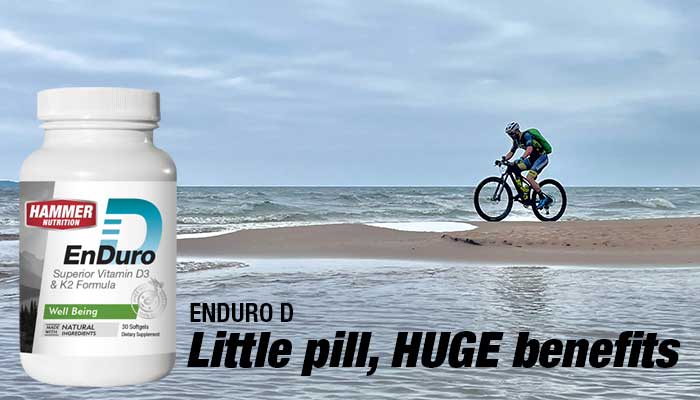
BY ENDURANCE NEWS STAFF
It’s no wonder why many people are confused about cholesterol because it's necessary for many aspects of human health while also being associated with several negative health consequences. For example, if we were to take a poll on cholesterol in general, we suspect that most people would lean more towards "negative" instead of "positive."
CHOLESTEROL POSITIVES – Among its numerous roles, cholesterol is essential for:
- The formation of all bodily steroid hormones
- Healthy brain function
- The myelin sheath that wraps around and protects neurons, which are primarily involved in transmitting information through electrical and chemical signals
- Providing antioxidant support
- Helping to counteract excessive stress
CHOLESTEROL NEGATIVES – Among other negative health consequences, excess cholesterol is associated with an increased risk of:
- Atherosclerosis is the buildup of plaque in the walls of arteries, which obstructs optimal blood flow.
- Hypertension (aka, high blood pressure).
- Gallstones are lumps of solid material that form in the gallbladder that can cause severe abdominal pain.
- Age-related macular degeneration, a disease that affects central vision, is the most common cause of severe loss of eyesight.
- Prostate cancer.
QUESTION: What increases cholesterol to excessive amounts?
ANSWER: While some cholesterol production, including excess amounts, is genetically inherited, the consumption of trans fat is clearly the main culprit. Unlike other types of fats, trans fats are not essential for life, and their consumption is not recommended. Trans fats can be found in nearly all processed foods, including fast food, snacks, fried food, and baked goods. Additionally, it is believed that people who consume high amounts of animal-sourced saturated fats, with minimal amounts of plant foods, have higher cholesterol than those whose diet contains ample amounts of fresh fruits and vegetables.
How to significantly lower cholesterol… by up to 30%!
1) Diet first. The most important thing is addressing the diet and correcting dietary errors, primarily excess intake of omega-6 fatty acids. Oxidized blood cholesterol is associated with cardiovascular health disease, and excess linoleic acid (LA) causes cholesterol to oxidize. Linoleic acid is an omega-6 essential fatty acid, and while it is necessary for human health, excess amounts are associated with numerous health disorders, including the earlier-mentioned oxidized blood cholesterol. Conversely, omega-3 fatty acids— EPA and DHA, found in fish, and alpha-linolenic acid (ALA), found in plant sources—are associated with a number of health benefits. The recommended ratio of omega-6 to omega-3 ratio is 4:1; however, most people's diets contain an omega-6 to omega-3 ratio of 20:1 (or higher), much higher than what people are genetically adapted to, and a ratio that is hugely responsible for excessively high cholesterol amounts.
The primary culprit for the omega-6 excess? Increased use and consumption of industrially processed seed oils referred to as vegetable oils. An expert on the subject, Dr. Chris Knobbe, states that these industrially processed seed oils “drive the oxidation. They’re pro-oxidative, proinflammatory, and toxic, but of all of these, it is oxidation. That is by far the worst.”
Cardiovascular research scientist, Dr. James DiNicolantonio, agrees and refers to these omega-6 seed oils as “drivers of coronary heart disease.” He summarizes:
Omega-6 polyunsaturated fat linoleic acid consumption has dramatically increased in the western world, primarily vegetable oils. Numerous evidence shows that omega-6 polyunsaturated fat linoleic acid promotes oxidative stress, oxidized LDL [the "bad" cholesterol], chronic low-grade inflammation, and atherosclerosis. In addition, omega-6 is likely a primary dietary culprit for causing CHD (Coronary Heart Disease), especially when consumed as industrial seed oils, commonly referred to as vegetable oils.
To reestablish the proper balance of omega-6's to omega-3's—helping to protect against serious health outcomes and return us to a much healthier state—we need to greatly reduce or eliminate the consumption of the following oils:
- Canola oil
- Corn oil
- Cottonseed oil
- Grapeseed oil
- Peanut oil
- Rice bran oil
- Safflower oil
- Soy oil
- Sunflower oil
It’s important to remember that most-to-all these highly processed seed oils are found not only in oil form but in processed/fast foods as well, so we also need to strive to eliminate them from our diet. As Dr. Catherine Shanahan states, "More than any other ingredient, vegetable oil is what puts the ‘junk’ in junk food.”
2) Consistent exercise. Master athletes are reported to have lipid profiles similar to young adults, decreasing their risk of heart disease. One study compared the effects of exercise between 61 master athletes and 51 overweight, sedentary men. The results:
- Plasma high-density lipoprotein cholesterol (HDL-C, the “good” cholesterol) concentrations were 42% higher in the master athletes than in the overweight, sedentary men.
- Triglyceride (TG) concentrations were 51% lower in the master athletes than in the overweight, sedentary men.
- Plasma low-density lipoprotein cholesterol (LDL-C, the “bad” cholesterol) levels were 9% lower in the athletes than in the overweight, sedentary men.
Additionally, the American College of Sports Medicine conclusively states:
Endurance training can help maintain and improve various aspects of cardiovascular function and enhance submaximal performance. Importantly, reductions in risk factors associated with disease states (heart disease, diabetes, etc.) improve health status and contribute to an increase in life expectancy.
3) Nutritional supplements. A number of nutrients/substances are reported to help lower elevated cholesterol levels. These include:
- Coenzyme Q10 and Trimethylglycine – Race Caps Supreme
- Acetyl-l-carnitine – Mito Caps
- Eicosapentaenoic Acid (EPA) and Docosahexaenoic Acid (DHA) – Enduromega
- Bifidobacteria longum and Lactobacillus acidophilus – Digest Caps
- Vitamins B3, B5, B6, and C, and the minerals magnesium and chromium – Premium Insurance Caps
- Vitamin C – Endurance C
- Magnesium – Essential Mg, Premium Insurance Caps, Endurolytes products, HEED, Recoverite
- Chromium – Chromium GTF, Premium Insurance Caps, HEED, Sustained Energy, Perpetuem, Recoverite
- Soy – Soy Protein, Sustained Energy, Perpetuem
- Gamma-Tocopherols and Tocotrienols – AO Booster
Conclusion
The combination of consistent exercise, optimal diet choices, and supplementation may reduce cholesterol levels anywhere from 8% to as much as 30%. In addition, a plant food-dominant diet added to regular exercise has been demonstrated to lower elevated cholesterol significantly. Nutrients in specific Hammer Nutrition products also help lower elevated cholesterol levels.










8 comments
Good read. Actually enjoy all your reads on heart health. Now it’s how to stay away from oils.
———
Hammer Nutrition replied:
Hello Dina, Thank you for your comment. To be clear, canola should never be consumed if possible. Non organic seed oils like sunflower seed oils as well (pesticides). However, organic avocado and walnut for cooking and oganic olive oil for salad and other low heart uses is very much encouraged. Omega 3 fish oil is also very beneficial. BDF
I really love this article as it has been my aim to lower cholesterol from the advice above and it has worked! This is not only a great reminder, but more lessons learned to help continue lowering cholesterol! Thanks so much!
Your articles make sense, thank you